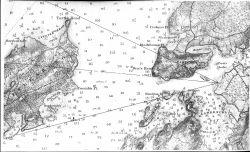loading 
Fitz Henry Lane
HISTORICAL ARCHIVE • CATALOGUE RAISONNÉ • EDUCATIONAL RESOURCE
An online project under the direction of the CAPE ANN MUSEUM
An online project under the direction of the CAPE ANN MUSEUM
Catalog entry
inv. 272
Castine Harbor and Town
Castine
1851 Oil on canvas 20 x 33 1/4 in. (50.8 x 84.5 cm) Signed and dated lower right: F H Lane 1851
|
Related Work in the Catalog
Supplementary Images
Provenance (Information known to date; research ongoing.)
the Artist, Gloucester, Mass.
Noah Brooks
Witherle Memorial Library, Castine, Maine, c. 1915
Hirschl & Adler Galleries, New York, 1978
Private collection
Berry-Hill Galleries, New York
Timken Museum of Art, San Diego, Calif., 1986
Exhibition History
Essex Institute, Salem, Massachusetts, Fitz Hugh Lane, 1804–1865: American Marine Painter, 1964., no. 52.
John Wilmerding, William A. Farnsworth Library and Art Museum, Rockland, Maine, Fitz Hugh Lane 1804-1805, July 12–September 15, 1974., no. 24, ill.
Hirschl & Adler Galleries, New York, New York, Recent Acquisitions of American Art, 1769–1938, March 3–31, 1979., no. 21.
Portland Museum of Art, Portland, Maine, State of Maine Collection: Grand Opening, 1983.
National Gallery of Art, Washington, District of Columbia, Paintings by Fitz Hugh Lane, May 15–September 5, 1988., no. 59, ill. in color, p. 146, Castine.
Traveled to: Museum of Fine Arts, Boston, Mass., 5–31, 1988.
Traveled to: Museum of Fine Arts, Boston, Mass., 5–31, 1988.
Published References
Wilmerding, John. Fitz Hugh Lane, 1804–1865: American Marine Painter. Salem, MA: The Essex Institute, 1964., no. 52, p. 58.
Wilmerding, John. Fitz Hugh Lane. New York: Praeger, 1971., pp. 58, 182.
Fitz Hugh Lane 1804-1865. Rockland, ME: William A. Farnsworth Library and Art Museum, 1974., no. 24, ill.
Banks, William Nathaniel. "Castine, Maine, and St. Andrews, New Brunswick, Canada." Antiques 118 (July 1980)., ill.
American Paintings, vol. 2. New York: Berry-Hill Galleries, 1983., p. 21.
Pincus, Robert L. "Timken Pays $1.25 Million for 19th Century Painting." San Diego Union, December 18, 1986.
Wilmerding, John. Paintings by Fitz Hugh Lane. Washington, DC: National Gallery of Art; in association with Harry N. Abrams, 1988., no. 59, ill. in color, p. 146, Castine.
Gallery Guide: European Paintings, American Paintings and Russian Icons in the Collection of the Putnam Foundation. San Diego, CA: Timken Museum of Art, 1991., p. 36.
Reed, Sue Welsh, and Carol Troyen. Awash in Color: Homer, Sargent, and the Great American Watercolor. Boston: Museum of Fine Arts, 1993., pp. 27–28.

Commentary
This scene was painted in 1851 for Noah Brooks of Castine from a plein air pencil drawing Castine Harbor and Town, 1851 (inv. 277), which was probably finished indoors in watercolor. We see Castine and its harbor from Hainey’s Point, just north of Henry’s Point on the east bank of the Bagaduce River, looking west toward the northwest side of Penobscot Bay. For the painting, Lane omitted the land in the drawing’s foreground, leaving the harbor and distant background terrain to give a sense of place. It is evening and a late summer sun glows through a thin overcast of stratus clouds as a warm front approaches.
The foreground excepted, the depiction of the setting is identical in both the sketch and the painting. The right side includes the most heavily settled part of Castine, with houses lining the shore, ending a half mile before reaching Dice’s Head with its lighthouse. At left is part of Nautilus Island, while beyond and extending across the harbor’s entrance lies North Isleboro. In the far distance (more easily distinguished in the watercolor), lie the hills of Penobscot Bay’s western shore. Within the harbor, to the right, is a pyramidal stone structure called a monument, located to mark the presence of shallows called Middle Ground. There is no indication of such a marker in the charts and sailing directions of the U.S. Coast Survey published in the early years of its work in this region (1860s and 70s).
The vessels portrayed are dwarfed by their surroundings, and the ones in the foreground are smaller examples of their rigs and hull types—local working craft and strictly utilitarian in form, finish, and use. At far left is a topsail schooner; next, a lumber brig (half-brig rig). In center foreground is a New England boat, normally used for fishing, but here with a party on board, either out for a pleasant cruise around the harbor or on their way to visit friends or relatives.
Astern of them is a coasting schooner with what looks like a deck load of firewood logs, or more likely, kiln wood for Castine’s busy lime kilns. At extreme right is a small boat—possibly a yawl boat—fitted for sailing.
Further down the harbor is a large merchant ship coming to anchor and taking in sail. Castine’s participation in the foreign trade arose out of her shipbuilding activity, leading from shipping a variety of goods and materials to becoming the most important importer of salt for Maine’s fishing industry. This led in turn to manufacturing fish netting and other fishing gear and being a major source of these materials for fishermen in the northern bay region.
Lane’s visits to Castine came at the high point of that town’s maritime enterprise. With the Civil War and postwar decline of Maine’s deep-water trade and fishing industry, the port faced a grim future, which was narrowly avoided by a blossoming tourist industry. Life in Castine—as in the rest of Penobscot Bay—was to go on in a very different way.
– Erik Ronnberg